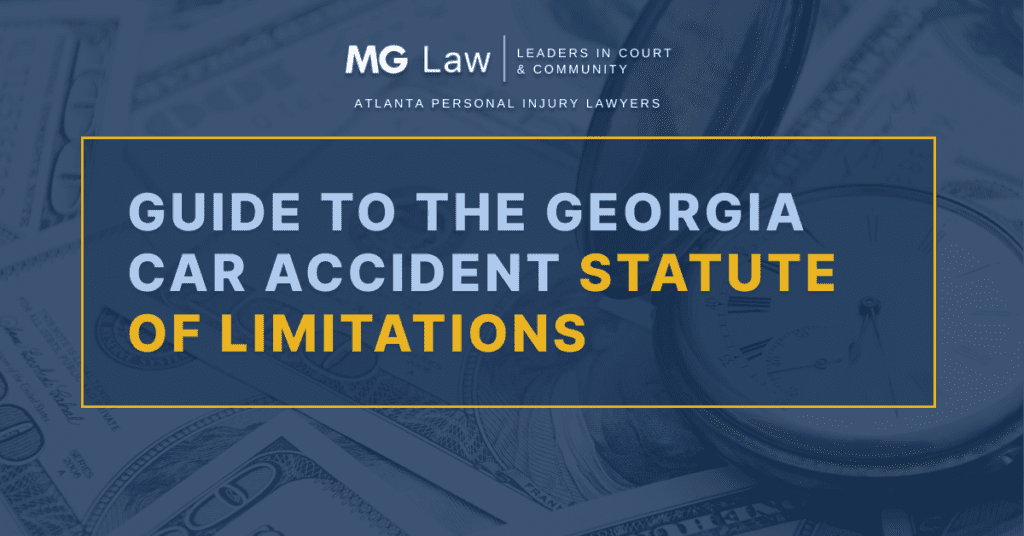
When a driver’s negligence causes a car accident and results in someone’s loss, the victim can file a lawsuit to recover their damages.
However, you can lose your right to file a lawsuit if you wait too long.
The car accident statute of limitations in Georgia creates a two-year time limit during which the person who suffers injuries, called the plaintiff, must file their claim against the person who caused their injuries, called the defendant.
Certain circumstances can affect the statute of limitations for auto accidents.
For a free consultation with an experienced Georgia car accident lawyer, please contact us online or call (770) 988-5252 today.
What Is the Car Accident Statute of Limitations in Georgia?
Georgia imposes a two-year statute of limitations on car accident claims. In some scenarios, an exception can extend or shorten the time. The clock starts ticking on the two years on the day of the accident.
Exceptions That Extend the Georgia Statute of Limitations for Auto Accidents

Georgia will extend the two-year statute of limitations for a car accident when certain factors exist in your case.
Disability or Incapacity
Georgia outlines an exception for people who are legally incompetent because of intellectual disability or mental illness when the cause of action accrues.
The two-year car accident statute of limitations period starts once the disability or mental illness causing their incompetence is over.
Children
The two-year period for children who are under eighteen years old when they are involved in a car accident begins from the date of their eighteenth birthday.
Defendant Leaves the State
The two-year statute of limitations for Georgia car accidents “tolls” or pauses when a defendant leaves the State of Georgia. This exception prevents potential defendants from leaving the state for two years after causing an accident to avoid liability.
Fraud
Section 9-3-96 extends the statute of limitations when the defendant commits fraud to prevent or deter the plaintiff from filing their action. The statutory period starts when the plaintiff discovers the fraud. This section does not extend the car accident statute of limitations in Georgia every time the opposing party lies to you, only when they are guilty of fraud.
An attorney can advise you on whether this exception applies to your case.
Criminal Investigation
In car accident cases, law enforcement needs to investigate the cause of the crash and decide whether to pursue charges against the at-fault party.
In Georgia, the statutory period tolls from the date the act is committed until the prosecution of such crime or act is finalized, as long as the period does not exceed six years. Many criminal prosecutions can take between six months and one year to conclude, so this exception can offer a plaintiff extra time to file their claim.
This exception can apply when a drunk driver causes a car accident that results in your losses. The two-year period begins once the defendant goes through the criminal justice system or has their charges dismissed.
Is the Statute of Limitations Ever Shortened?
The car accident statute of limitations is shorter when the collision involves a government-owned vehicle. The statutory period is six months for car accident claims involving a city or county-owned vehicle and one year for a state-owned vehicle.
Consequences of Letting the Statute of Limitations Expire
Allowing the Georgia statute of limitations for car accidents to expire eliminates your right to recover from the party that caused the accident. If you try to file your lawsuit once the period ends, the judge will likely dismiss your case.
What Can Cause Someone to Miss a Statutory Deadline?
Some people do not know they are entitled to compensation after an accident, so they do not file a lawsuit. Once they realize they can recover their losses, the statutory period may have already expired.
Another reason someone injured in an accident may not start the legal process is their fear of paying an attorney. You should not let concerns about attorneys’ fees prevent you from seeking the compensation you deserve. Our team works on a contingency fee basis, so you do not have to pay a dollar unless we recover a settlement or judgment on your behalf.
Do not let your reservations about filing a car accident claim make you miss the statute of limitations.
Why Does Georgia Impose a Statute of Limitations on Car Accident Cases?
The statute of limitations serves many different purposes in the court process. One of the primary reasons Georgia imposes a statute of limitations is to ensure there is still evidence available to prove the car accident claim.
In car accident cases, the plaintiff must show how the defendant’s negligence caused their losses. The evidence you need to prove your case can disappear over time, weakening your accident claim. After all, a witness will likely remember more about the accident during an interview two weeks after the crash than over two years later.
Another reason to impose a statute of limitations is to prevent someone from living the rest of their life in fear of being pulled into court for something that happened decades prior. The statutory period forces plaintiffs to bring their claims within two years of the accident or give up the right to file them.
Your case does not need to finish before the two-year period expires. You only need to file the claim before it ends to prevent your case from being dismissed.
Contact the Experienced Auto Accident Lawyers at MG Law
You cannot file your car accident claim after the statute of limitations expires. Contact a member of MG Law as soon as possible after your car accident so we can make sure your claim is filed before the statutory period ends.
Our founding attorney, Michael Geoffroy, has extensive experience handling car accident cases. Michael has been named Top 40 Under 40, a Rising Star, and holds a 10.0 rating on Avvo.
If you or a loved one suffered injuries in a Georgia car accident, contact us online or call (770) 988-5252 as soon as possible for a free consultation.

